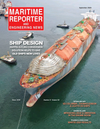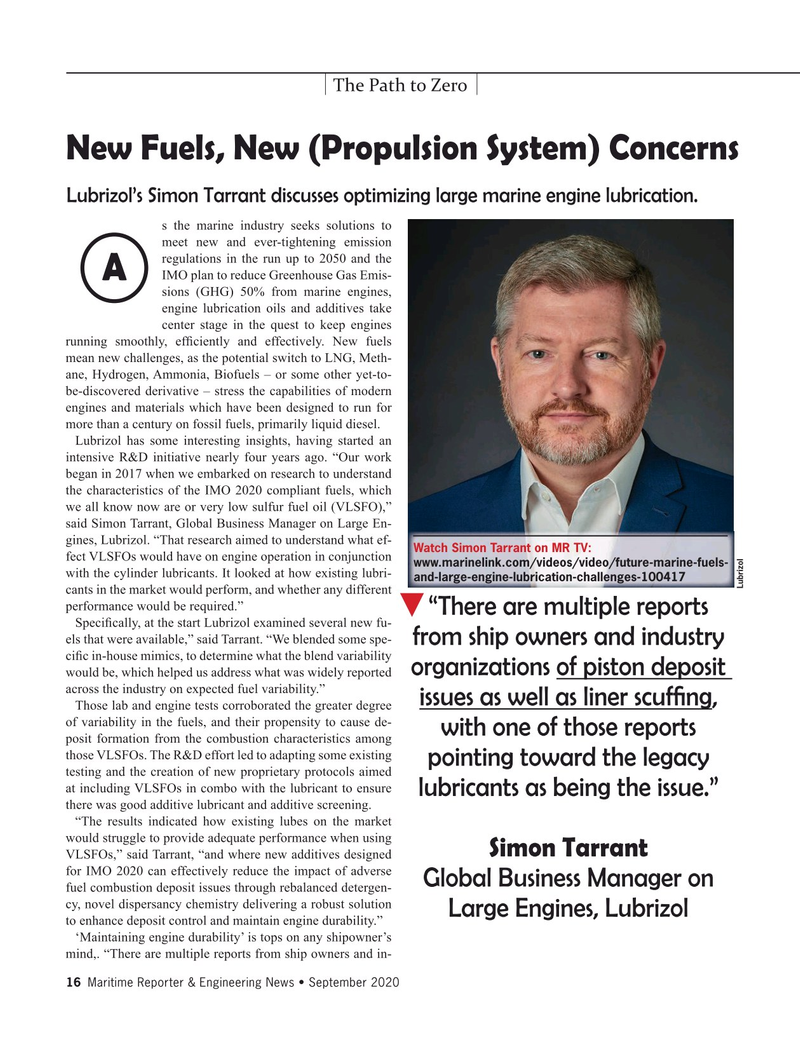
Page 16: of Maritime Reporter Magazine (September 2020)
Marine Design Annual
Read this page in Pdf, Flash or Html5 edition of September 2020 Maritime Reporter Magazine
The Path to Zero
New Fuels, New (Propulsion System) Concerns
Lubrizol’s Simon Tarrant discusses optimizing large marine engine lubrication.
s the marine industry seeks solutions to meet new and ever-tightening emission regulations in the run up to 2050 and the
IMO plan to reduce Greenhouse Gas Emis-
A sions (GHG) 50% from marine engines, engine lubrication oils and additives take center stage in the quest to keep engines running smoothly, ef? ciently and effectively. New fuels mean new challenges, as the potential switch to LNG, Meth- ane, Hydrogen, Ammonia, Biofuels – or some other yet-to- be-discovered derivative – stress the capabilities of modern engines and materials which have been designed to run for more than a century on fossil fuels, primarily liquid diesel.
Lubrizol has some interesting insights, having started an intensive R&D initiative nearly four years ago. “Our work began in 2017 when we embarked on research to understand the characteristics of the IMO 2020 compliant fuels, which we all know now are or very low sulfur fuel oil (VLSFO),” said Simon Tarrant, Global Business Manager on Large En- gines, Lubrizol. “That research aimed to understand what ef-
Watch Simon Tarrant on MR TV: fect VLSFOs would have on engine operation in conjunction www.marinelink.com/videos/video/future-marine-fuels- with the cylinder lubricants. It looked at how existing lubri- and-large-engine-lubrication-challenges-100417
Lubrizol cants in the market would perform, and whether any different performance would be required.” “There are multiple reports
Speci? cally, at the start Lubrizol examined several new fu- els that were available,” said Tarrant. “We blended some spe- from ship owners and industry ci? c in-house mimics, to determine what the blend variability organizations of piston deposit would be, which helped us address what was widely reported across the industry on expected fuel variability.” issues as well as liner scuf? ng,
Those lab and engine tests corroborated the greater degree of variability in the fuels, and their propensity to cause de- with one of those reports posit formation from the combustion characteristics among those VLSFOs. The R&D effort led to adapting some existing pointing toward the legacy testing and the creation of new proprietary protocols aimed at including VLSFOs in combo with the lubricant to ensure lubricants as being the issue.” there was good additive lubricant and additive screening. “The results indicated how existing lubes on the market would struggle to provide adequate performance when using
Simon Tarrant
VLSFOs,” said Tarrant, “and where new additives designed for IMO 2020 can effectively reduce the impact of adverse
Global Business Manager on fuel combustion deposit issues through rebalanced detergen- cy, novel dispersancy chemistry delivering a robust solution
Large Engines, Lubrizol to enhance deposit control and maintain engine durability.” ‘Maintaining engine durability’ is tops on any shipowner’s mind,. “There are multiple reports from ship owners and in- 16 Maritime Reporter & Engineering News • September 2020
MR #9 (1-17).indd 16 9/9/2020 7:44:55 AM

 15
15

 17
17
